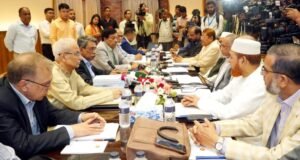 The Indian Ministry of Home Affairs has said it prevented aGreenpeace India activist from boarding a flight to Britain in January, where she was scheduled to brief members of Parliament on the effect of mining on indigenous communities in central India, because her visit was “prejudicial to the national interest” and would hurt India’s image abroad.
The Indian Ministry of Home Affairs has said it prevented aGreenpeace India activist from boarding a flight to Britain in January, where she was scheduled to brief members of Parliament on the effect of mining on indigenous communities in central India, because her visit was “prejudicial to the national interest” and would hurt India’s image abroad.
Priya Pillai, an activist who had been fighting coal mining in the Mahan forest, was stopped by immigration control at the airport in New Delhi on Jan. 11 and barred from traveling. A government affidavit in the case, said Ms. Pillai’s name appeared on a no-fly list generated from a secret database of the Intelligence Bureau. Shortly thereafter, she filed a court petition against the Ministry of Home Affairs, asking for her right to travel to Britain to be reinstated, as well as for monetary compensation for mental
The case has raised alarm among some nongovernmental organizations, which say the government of the new prime minister, Narendra Modi, is continuing the previous government’s policy of singling out NGOs that it believes are hurting the country’s potential for economic growth. Greenpeace India said the Pillai case and other government actions made social welfare groups feel scrutinized.
“If you ask me, it’s a possible pincer strategy,” Samit Aich, the executive director of Greenpeace India, said in an interview after Ms. Pillai was barred from flying. “Greenpeace India is at the forefront of being targeted, but most certainly there is a sense that for civil society, this is a message.”
An Intelligence Bureau report made public last summer said several foreign-based and local NGOs that oppose various development projects were hurting India’s economy. Greenpeace, ActionAid, Amnesty International and several local groups were named in the report. Some leaders of the groups are further concerned because their permits under the Foreign Contribution Regulation Act, which governs the roughly 45,000 NGOs in India allowed to receive foreign funds, are coming up for renewal.
The government canceled an Essar Energy and Hindalco Industries coal-mining concession last year, along with 200 other mining agreements nationwide. Ms. Pillai, in a telephone interview after she was prevented from flying to Britain, said that 54 tribal villages in the Mahan forest area would have suffered if the mine project had proceeded, and that the forests were still in danger from new mining projects. “We’ve been constantly hounded,” she said. Greenpeace India had maintained that mining would destroy hundreds of thousands of trees, ending the livelihoods in the villages, where people rely on forest produce.
The government said her testimony would have led to a “false and misleading depiction of India’s massive efforts” to protect the rights of such people.
Ms. Pillai was scheduled to testify before a cross-party group of members of Parliament on tribal affairs during her visit. The ministry said her travel raised national security concerns, asserting that such testimony is used to gather information for human rights reports by Western countries, including such parliamentary groups, about India and other nations. The documentation, the affidavit continued, left India “open to a potential sanction regime.”
The documentation could be used as “an instrument of control to subdue India’s increasing strength on global platforms,” the affidavit continued, potentially damaging its prospects for growth by scaring away foreign investment. Mr. Modi has made it a point to stress foreign investment in Indian manufacturing, beginning a “Made in India” campaign in 2014 shortly before traveling to the United States.
Indira Jaising, a lawyer representing Ms. Pillai, said her case was an issue of personal freedom.
“She is free to present data, present information about the condition of tribals as she perceives them,” Ms. Jaising said in an interview. “You can have a different view of what is development, what is tribal rights, than what the ruling government has. That doesn’t make you anti-national.”
The next hearing on the petition is scheduled for Wednesday.
Ms. Pillai’s case is just the most recent instance of government action against Greenpeace India. In 2014, the government froze $267,000 in funds from Greenpeace International and ClimateWorks, an American organization, meant to go to Greenpeace India, an action the Delhi High Court overturned in January. In another instance, the Income Tax Department taxed contributions to Greenpeace India for 2010-11 as income, the group said, saying the funds did not result from charitable activity and were therefore not tax-exempt.
“This is an anxious time for many NGOs,” Nisha Agrawal, the chief executive of Oxfam India, wrote in an email. Many are labeled “antidevelopment” and have had foreign funds blocked. “And this is all happening in a murky and surreptitious manner with no one in government willing to take any responsibility for it.”
 Weekly Bangla Mirror | Bangla Mirror, Bangladeshi news in UK, bangla mirror news
Weekly Bangla Mirror | Bangla Mirror, Bangladeshi news in UK, bangla mirror news






